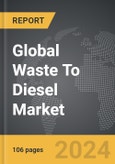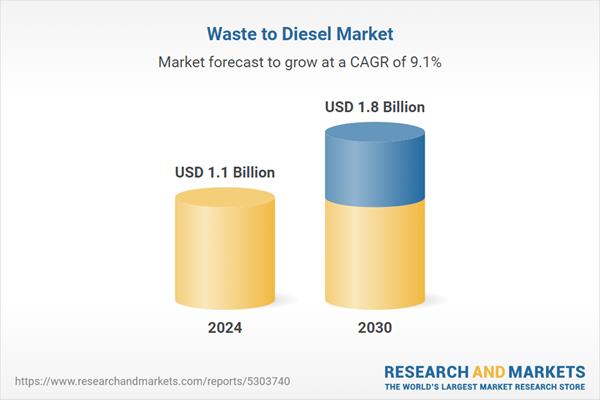Global Waste to Diesel Market - Key Trends & Drivers Summarized
What Is Waste to Diesel, and Why Is It So Crucial in Modern Energy and Waste Management?
Waste to Diesel is a process that converts various types of waste, such as plastic waste, used cooking oil, municipal solid waste (MSW), and industrial waste, into diesel fuel. This conversion is achieved through techniques like pyrolysis, gasification, and transesterification, which break down waste materials into fuel-grade hydrocarbons. Waste to diesel solutions provide an alternative energy source that not only supports sustainable fuel production but also addresses waste management issues by diverting waste from landfills and reducing environmental pollution.The importance of the waste to diesel process lies in its dual role of producing alternative fuel while reducing waste. It contributes to a circular economy by repurposing waste materials into a valuable resource, supporting sustainability and energy independence. Diesel produced from waste has a lower carbon footprint compared to conventional diesel, making it a cleaner alternative for sectors like transportation, agriculture, and industry. As global concerns about waste accumulation, fossil fuel dependency, and greenhouse gas emissions grow, waste to diesel has emerged as a crucial technology for cleaner energy production and effective waste management.
How Are Technological Advancements Shaping the Waste to Diesel Market?
Technological advancements have significantly improved the efficiency, scalability, and environmental impact of Waste to Diesel conversion, driving innovation across various sectors. One of the major developments is in pyrolysis technology, which thermally decomposes plastic waste and other organic materials in an oxygen-free environment to produce diesel, along with other byproducts like syngas and char. Innovations in pyrolysis reactors have improved energy efficiency, yield rates, and operational scalability, making it easier to process larger volumes of waste with reduced energy input.Advancements in gasification technology have also enhanced waste-to-diesel production. Gasification involves converting waste into syngas (a mixture of hydrogen, carbon monoxide, and methane), which can be further processed into synthetic diesel via the
Fischer-Tropsch synthesis. This method enables the conversion of diverse waste types, including biomass and industrial waste, into high-quality diesel. Recent improvements in gasifier designs, catalysts, and syngas cleaning techniques have increased the conversion efficiency and quality of diesel, supporting commercial-scale production.
The rise of integrated waste processing systems has further optimized the waste-to-diesel process. These systems combine waste sorting, shredding, and pre-treatment with advanced chemical and thermal processing, enhancing feedstock quality and fuel yields. Additionally, advancements in transesterification, used for converting waste oils and fats into biodiesel, have improved the purity and consistency of diesel fuel produced from waste cooking oil, animal fats, and other organic waste streams. These technological innovations not only expand the capabilities of waste-to-diesel production but also align with broader trends toward sustainable fuel production, waste reduction, and carbon-neutral energy solutions in modern industrial and energy sectors.
What Are the Emerging Applications of Waste to Diesel Across Different Sectors?
Waste to Diesel is finding expanding applications across a wide range of sectors, driven by the need for sustainable energy solutions, effective waste management, and reduced greenhouse gas emissions. In the transportation sector, waste-derived diesel is used as an alternative fuel for trucks, buses, ships, and heavy machinery. It provides a cleaner alternative to fossil-based diesel, helping to reduce carbon emissions and meet stricter environmental regulations. Waste-derived diesel can be used directly in existing diesel engines without modification, making it a convenient solution for fleet operators seeking to lower their carbon footprint.In the industrial sector, waste-derived diesel is used to power equipment, generators, and machinery, particularly in off-grid or remote locations where renewable energy solutions may be limited. Industries like mining, agriculture, and construction benefit from using waste-to-diesel solutions to fuel operations, as it not only offers cost savings but also aligns with sustainability goals. In addition, waste-derived diesel serves as a reliable backup fuel for emergency power generators in facilities like hospitals, data centers, and government buildings, ensuring energy security while reducing dependency on traditional fossil fuels.
In the municipal sector, waste-to-diesel plants are integrated into urban waste management systems to process municipal solid waste (MSW), diverting it from landfills and converting it into diesel. This approach helps municipalities manage waste more efficiently while generating revenue through the sale of diesel fuel. Additionally, waste-to-diesel technologies are used in marine and aviation sectors as part of efforts to decarbonize fuels for ships and airplanes, where traditional renewable energy sources like electric power are currently not feasible. By producing low-carbon diesel from waste, these sectors can achieve compliance with emission reduction targets and improve environmental performance.
In the agricultural sector, waste-derived diesel is used to fuel tractors, irrigation pumps, and other farming equipment. The conversion of agricultural waste, such as crop residues, animal manure, and used oils, into diesel not only provides a sustainable fuel source but also reduces the environmental impact of waste disposal in farming communities. The expanding applications of waste to diesel across these sectors highlight its critical role in enabling sustainable energy production, reducing waste, and supporting carbon-neutral operations in both urban and rural environments.
What Drives Growth in the Waste to Diesel Market?
The growth in the Waste to Diesel market is driven by several factors, including increasing waste management challenges, rising demand for alternative fuels, and supportive government regulations. One of the primary growth drivers is the global increase in waste generation, which has led to mounting pressure on waste management systems and landfill capacities. Waste-to-diesel solutions provide a practical way to divert waste from landfills, converting it into a valuable energy source that supports a circular economy. This approach not only addresses waste disposal challenges but also contributes to cleaner energy production, making it an attractive option for governments and waste management companies.The growing demand for alternative, low-carbon fuels has further fueled adoption of waste-to-diesel technologies. As industries and governments aim to reduce greenhouse gas emissions and meet international climate goals, waste-derived diesel offers a viable solution with a lower carbon footprint compared to traditional fossil fuels. The ability to use waste-based diesel in existing diesel engines without modifications makes it a cost-effective choice for transitioning to cleaner energy sources, particularly in sectors like transportation, logistics, and industry.
Government regulations and incentives supporting waste-to-energy projects have also contributed to market growth. Policies that promote renewable energy, carbon credits, and waste reduction initiatives encourage investments in waste-to-diesel infrastructure. Governments across Europe, North America, and Asia-Pacific have implemented regulations that support the production and use of waste-derived fuels, providing financial incentives, tax credits, and grants to projects that convert waste into sustainable fuels. Additionally, growing awareness and consumer preference for sustainable products have driven demand for low-carbon fuels in various applications, from public transportation to corporate logistics.
With ongoing innovations in waste processing technologies, energy efficiency, and integrated waste management systems, the waste-to-diesel market is poised for strong growth. These trends, combined with increasing demand for sustainable fuels, effective waste management solutions, and supportive regulatory frameworks, make waste to diesel a vital component of modern energy strategies focused on reducing carbon emissions, promoting circular economies, and achieving sustainability goals across various sectors.
SCOPE OF STUDY:
The report analyzes the Waste To Diesel market in terms of units by the following Segments, and Geographic Regions/Countries:- Segments: Type (Municipal Waste, Oil & Fat Waste, Plastic Waste); Technology (Pyrolysis, Gasification, Incineration, Depolymerisation)
- Geographic Regions/Countries: World; United States; Canada; Japan; China; Europe (France; Germany; Italy; United Kingdom; and Rest of Europe); Asia-Pacific; Rest of World.
Key Insights:
- Market Growth: Understand the significant growth trajectory of the Municipal Waste segment, which is expected to reach US$953.6 Million by 2030 with a CAGR of a 9.6%. The Oil & Fat Waste segment is also set to grow at 8.8% CAGR over the analysis period.
- Regional Analysis: Gain insights into the U.S. market, valued at $308.1 Million in 2024, and China, forecasted to grow at an impressive 8.4% CAGR to reach $279.3 Million by 2030. Discover growth trends in other key regions, including Japan, Canada, Germany, and the Asia-Pacific.
Why You Should Buy This Report:
- Detailed Market Analysis: Access a thorough analysis of the Global Waste, covering all major geographic regions and market segments.
- Competitive Insights: Get an overview of the competitive landscape, including the market presence of major players across different geographies.
- Future Trends and Drivers: Understand the key trends and drivers shaping the future of the Global Waste.
- Actionable Insights: Benefit from actionable insights that can help you identify new revenue opportunities and make strategic business decisions.
Key Questions Answered:
- How is the Global Waste expected to evolve by 2030?
- What are the main drivers and restraints affecting the market?
- Which market segments will grow the most over the forecast period?
- How will market shares for different regions and segments change by 2030?
- Who are the leading players in the market, and what are their prospects?
Report Features:
- Comprehensive Market Data: Independent analysis of annual sales and market forecasts in US$ Million from 2024 to 2030.
- In-Depth Regional Analysis: Detailed insights into key markets, including the U.S., China, Japan, Canada, Europe, Asia-Pacific, Latin America, Middle East, and Africa.
- Company Profiles: Coverage of players such as Covanta Energy Corporation, Foster Wheeler A.G., Green Alliance, Klean Industries Inc., Plastic2Oil, Inc. and more.
- Complimentary Updates: Receive free report updates for one year to keep you informed of the latest market developments.
Some of the 68 companies featured in this Waste To Diesel market report include:
- Covanta Energy Corporation
- Foster Wheeler A.G.
- Green Alliance
- Klean Industries Inc.
- Plastic2Oil, Inc.
- Solena Group Corporation
- Ventana Ecogreen Inc.
This edition integrates the latest global trade and economic shifts as of June 2025 into comprehensive market analysis. Key updates include:
- Tariff and Trade Impact: Insights into global tariff negotiations across 180+ countries, with analysis of supply chain turbulence, sourcing disruptions, and geographic realignment. Special focus on 2025 as a pivotal year for trade tensions, including updated perspectives on the Trump-era tariffs.
- Adjusted Forecasts and Analytics: Revised global and regional market forecasts through 2030, incorporating tariff effects, economic uncertainty, and structural changes in globalization. Includes segmentation by product, technology, type, material, distribution channel, application, and end-use, with historical analysis since 2015.
- Strategic Market Dynamics: Evaluation of revised market prospects, regional outlooks, and key economic indicators such as population and urbanization trends.
- Innovation & Technology Trends: Latest developments in product and process innovation, emerging technologies, and key industry drivers shaping the competitive landscape.
- Competitive Intelligence: Updated global market share estimates for 2025, competitive positioning of major players (Strong/Active/Niche/Trivial), and refined focus on leading global brands and core players.
- Expert Insight & Commentary: Strategic analysis from economists, trade experts, and domain specialists to contextualize market shifts and identify emerging opportunities.
- Complimentary Update: Buyers receive a free July 2025 update with finalized tariff impacts, new trade agreement effects, revised projections, and expanded country-level coverage.
Table of Contents
Companies Mentioned (Partial List)
A selection of companies mentioned in this report includes, but is not limited to:
- Covanta Energy Corporation
- Foster Wheeler A.G.
- Green Alliance
- Klean Industries Inc.
- Plastic2Oil, Inc.
- Solena Group Corporation
- Ventana Ecogreen Inc.
Table Information
| Report Attribute | Details |
|---|---|
| No. of Pages | 170 |
| Published | February 2026 |
| Forecast Period | 2024 - 2030 |
| Estimated Market Value ( USD | $ 1.1 Billion |
| Forecasted Market Value ( USD | $ 1.8 Billion |
| Compound Annual Growth Rate | 9.1% |
| Regions Covered | Global |









